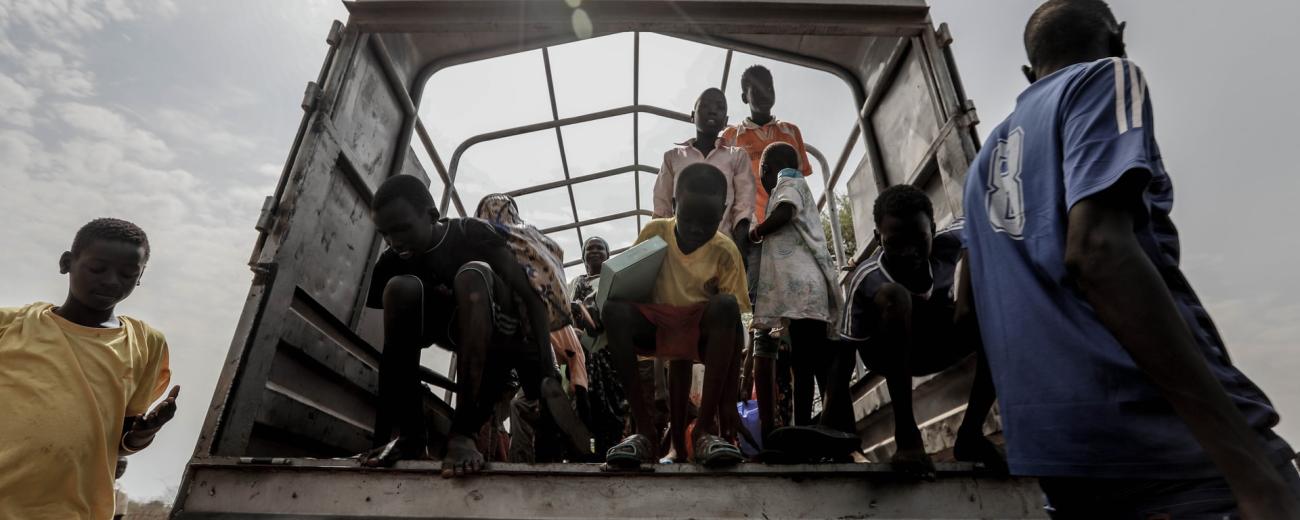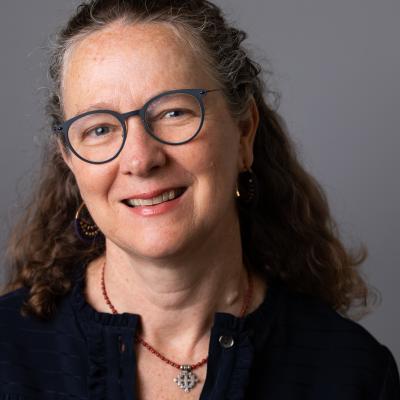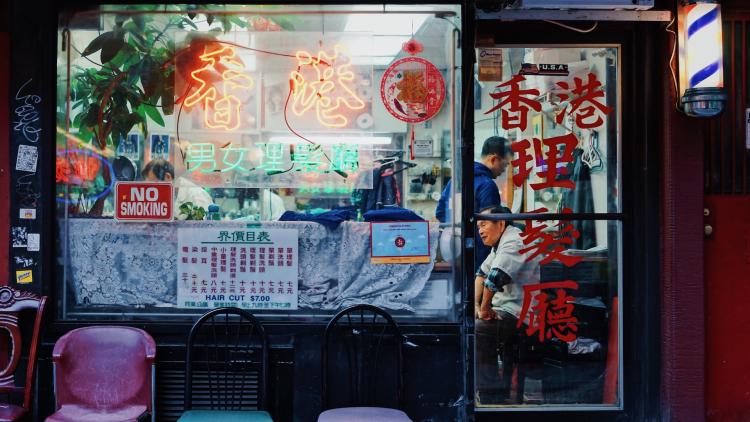Migration and Development Cluster


Aims and themes
Members of this research cluster focus on the broad and deep relationship between migration and development, conceiving these two social processes as dialectically interconnected.
Migration both reproduces and unsettles the structures and forces that shape our globalised world. We study this dialectical relation with historical specificity and empirical detail and we are committed to foregrounding the subjective perspectives, embodied experiences, and situated knowledges of the individual migrants or migrant groups that ultimately animate this relation.
Our research reflects the department’s diverse disciplinary and epistemological concerns, and approaches the study of migration and development through political economy, decolonial, postcolonial, and institutionalist perspectives, drawing from debates in Sociology, Geography, Politics and Anthropology. Our research engages with policy-making processes and strives to conceive innovative avenues for political intervention.
Research themes include:
- Humanitarianism, IDP and refugee displacement
- Political economy of labour migration
- Borders and the governance of migration
- Asylum and detention
- Livelihoods, remittances, and sustainable development
The cluster’s research informs teaching across the department’s interdisciplinary programmes, including the MSc Migration, Mobility and Development and MSc Humanitarian, Aid and Conflict, and supports a variety of courses, including Migration and Policy, Borders and Development, Working Poor and Development, Refugee Studies and Global Forced Migration. We organise a Seminar Series and various other activities, including hosting screenings for the London Migration Film Festival, through the SOAS Centre for Migration and Diaspora Studies.
Selected recent publications
- Novak, Paolo (2025) Buildings of Refuge and the Postcoloniality of Asylum Infrastructure. Bristol: Bristol University Press
- Lindley, A., K. Datta, E. Chase, K. Fadal, L. Hammond, G. Loureiro & S. Majeed-Hajaj (2024).'Remitting through crisis: Looking beyond resilience in UK migrant and diaspora communities' Migration Studies, 12(3)
- Mezzadri, A., 2024. Value theories in motion: Circular labour migration, unfinished land dispossession and reproductive struggles across the urban–rural divide. Environment and Planning F, p.26349825231224027.
- Cobarrubias, Sebastian and Novak, Paolo, 2024. Embedding Externalisation: How Bordering Practices Transform Places, Geopolitics (30), 1, pp 1-18
- Lim, I. & K. Datta (2024) Changing practices of providing (financial) care: gender, digital access and remittances during COVID-19 Research Handbook on Migration, Gender, and COVID-19
- Akram‐Lodhi, A.H., Yadav, S., Mezzadri, A. and Taylor, M., 2025. What Is the Value of Value for Agrarian Studies?. Journal of Agrarian Change, p.e70020.
- A Lindley (2023). "Reflections on (Im)mobilities in/and Crisis" in N. Piper and K. Datta (ed) Elgar Companion on Migration and the Sustainable Development Goals. Edward Elgar.
- A Lindley (2023) "The global ordering of remittances: formalisation, facilitation, funnelling and financialisation" in A. Pecoud and H. Thiollet (ed) Handbook of Global Governance of Migration. Edward Elgar.
- A Lindley (2022) "'Hit and Miss?' Access to legal assistance in immigration detention" Journal of Human Rights Practice 13 (3), 629–653.
- AM Rivas, M Safi (2022) "Women and the Afghan peace and reintegration process" International Affairs 98 (1), 85-104.
- L Tilley & Ajl, M. (2022). "Eco-socialism will be anti-eugenic or it will be nothing: Towards equal exchange and the end of population" Politics (OnlineFirst)
- A Mezzadri, K Banerjee (2022) "When the Lewisian Dream Sours: Industrial Aspirations and Reverse Labour Migration" Journal of South Asian Development 17 (3), 297-326
- J Lerche, A Shah, I Bosc, M Fajerman, N Wadhawan (2022). Understanding patterns of structural discrimination of migrant and other workers in some countries of South and West Asia ILO Background Paper
- P Novak (2022). "Re-producing the Humanitarian Border. Geopolitics" ahead of print, 1-22
- A Lindley (2021). What are we afraid of? Exploring risk and immigration detention. Migration Studies 9 (1), 90-114
- I Lim (2021) "Exploring Experience at the Intersection of Migration and Digital Democracy in South Korea" Asiascape: Digital Asia, 8(3), 139-163.
- P Novak (2021) "Deservingness and uneven geographies of asylum accommodation" Social Policy and Society 20 (3), 452-463
- L Hammond 2021. "Towards Development Solutions to Internal Displacement: A Political Economy Approach" UNDP, New York
Knowledge Exchange highlights
- Lindley, A., A. Mamo & H. Reed (2024) Home Beyond the Home Office: Addressing Refugee Move-On Challenges in the Oxford Area. Oxford: Asylum Welcome. Short output: Home Beyond the Home Office? Evicted from asylum accommodation into the UK housing crisis DevTrac Policy Brief.
- Lindley, A. (2023) Supporting Sanctuary-Seekers to find Housing in Wales. Mid-Term Evaluation Tai Pawb Refugee and Asylum Seeker Housing Project. Short output: ‘Housing people seeking sanctuary in Wales’ Tai Pawb Blog
- Bolaji, O. (2023) Nigerians can only send money home in US dollars - Africa at LSE, LSE blog
- Bolaji, O. (2023) Giving back: Exploring the scope and impact of education remittances to Nigeria World Bank blog
- K. Datta, E. Chase, L. Hammond, A. Lindley (2023) Migration, diasporas, and remittances during Covid-19 - RGS Royal Geographical Society resource pack for A-level Geography teachers and students
- L Hammond, A Lindley with Chase, E., Datta, K., Fadal, K., Majeed-Hajaj, S., Loureiro, G (2022) Access to Care and Support During Covid-19. Connecting During Covid-19, Policy Brief. London: Queen Mary
- P Novak (2022) The Humanitarian Border in Place, Border Criminologies Blog
- A Lindley, L Hammond with Majeed-Hajaj, Saliha and Loureiro, Gabriela Silva and Datta, Kavita and Chase, Elaine (2021) Connecting during Covid-19: Practices of care, remittance sending and digitisation among UK’s migrant communities. Community Spotlight Workshop
- P Novak (2021) Why is the new Nationality and Borders Bill being dubbed ‘anti-refugees’? Borders and Development Blog
- A Lindley (2020) The Detention Duty Advice scheme: research summary'
- A Lindley (2020) 'Detention, risk and Covid-19' Detention Forum Blog
- Novak Paolo (2019) The left case for open borders State of Nature
Recent and current PhD students
- C. Marcel (2024) Navigating Precarity: the lives of London’s migrant cleaners. Phd Thesis. SOAS University of London
- H. Shebeshe - PhD project final year: ‘But we don’t do cricket’ - An exploration of ‘belonging’ within the Ethiopian and Eritrean communities in the UK.
- Bolaji, Olufemi (2022). Diaspora finance for infrastructure development in Nigeria: exploring motivations, mechanisms and impact. PhD Thesis. SOAS University of London
- Dege Yonca (2022) Economic Activities of Syrian Refugees in the Context of Turkey’s Volatile Political Landscape
- Lim Iris (2022) Makers, Brokers, and Migrants: Experiences of Digital Government in South Korea and the United Kingdom
- Sowa Christian (2022) The Camp, Housing, and the City. On Migrant Camp Accommodation in Berlin
- Olufemi (2022) Diaspora finance for infrastructure development in Nigeria: exploring motivations, mechanisms and impact
- Ould Moctar Hassan (2021) EU Border Externalisation and the Postcolonial Conditioning of Contemporary Capitalism in Mauritania
- Iversen Karen (2021) Humanitarian Activist Citizens: Desplazado protests and state humanitarianism in Bogotá, Colombia








